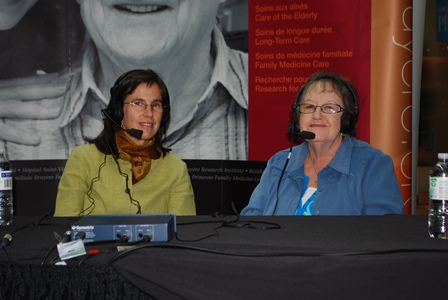
Lise didn’t know she had it in her. She didn’t know she had the skills and the strength to grant her husband Roger his last wish – to die at home.
“I knew from the start he wasn’t going to get better,” says Lise. “As soon as they took out his prostate for the first time — I was scared.”
Lise wasn’t alone in her experience, supporting her in the background 24/7 was the Regional Palliative Consultation Team (RPCT).
The Regional Palliative Consultation Team is a bilingual, outpatient service funded by the Ministry of Health and Long-Term Care, sponsored by Bruyère Continuing Care and the Champlain CCAC. The Team includes the full-spectrum of nursing services and has recently been enriched with the addition of five new Nurse Practitioners. The RPCT promotes the application of the Canadian Hospice Palliative Care Association standards of practice.
“The first time Lise called she was in a real crisis at home,” says RPCT nurse Maryse Bouvette.
MORE: RETHINKING THE TRADITIONAL HOSPITAL MODEL FOR ELDER CARE
Lise tells of how she needed the RPCT to help her and her husband. “Dr. Frances Kilbertus our family practitioner and Maryse came to see Roger at the house,” recalls Lise. “Dr. Kilbertus looked at him and said, ‘How can I help you?’ He said, ‘I want to die at home, and I want you to make that possible.”
The RPCT is a unique collaborative model which leverages inter-professional expertise, with a focus on building capacity for palliative and end-of-life expertise/management in primary care and fosters greater integration across the health system.
“It’s a big decision for a family or essentially a community which has assembled around someone whose life is ending,” says Dr. Kilbertus, Roger’s practitioner. “It can be someone’s wish (to die at home) but you really need to have the support in your home and she was willing to support him. Lise has an enormous amount of courage.”
The RPCT works collaboratively with: family physicians, nurse practitioners and primary health care teams, Champlain CCAC service providers, community nurses, hospitals, hospices, long-term care facilities, colleges and universities, and Champlain CCAC Care Coordinators.
MORE: SPREADING HEALTHCARE INNOVATION
Anytime help is required to support patients with a life limiting disease, the caring and expert team of palliative experts is there to help 24 hours a day, 7 days a week. The RPCT promotes improvements and integration of palliative care by establishing links and building partnerships.
Palliative care consultations are done with health care providers, by phone, email, fax, video conferencing as well as in client’s home, LTC facilities, hospices etc. The service covers the entire Champlain region.
“He was my soul mate. My love. I never knew such a gentle man could exist,” says Lise.
“You do this type of care because of love in many ways. It represents an enormous commitment to another person,” claims Dr. Frances Kilbertus.
“The day he passed away, I called the RPCT and they told me, ‘Lise, we’re going to go through this together. You are not alone,” Maryse says, “She was not alone in a way because Lise knew there was this virtual support. That support could come at the time that she needed it.”
“I lay down in the bed beside him and I held him in my arms and I told him, ‘I love you very much and you gave me a lot and I’ll never forget everything you gave me. You loved me for myself and I never thought anybody would. Then he lifted his head but he didn’t open his eyes. And then he stopped…he stopped breathing. I got out of bed and Maryse came in the room and she took me in her arms and she said, ‘You did such a good job taking care of Roger. I’m so proud of you.”
MORE: GERIATRICIANS CAN HELP AGING LOVED ONES
Maryse remembers, “We were able to be there for her at the time she needed it. She knew she could count on someone and she felt heard. I think that’s the most important thing.”
The Regional Palliative Consultation Team made it possible to give Roger his dignity to stay at home. Like he always wanted.
Who Can Refer to the Regional Palliative Consultation Team?
• Primary care providers
• Community hospitals with no palliative care services
• Long-Term Care Homes
• Retirement Homes
• Nurses providing end-of-life care in the community
• CCAC Care Coordinators
• Other palliative care resources
How to Reach the Regional Palliative Consultation Team – 1 800 651 1139

